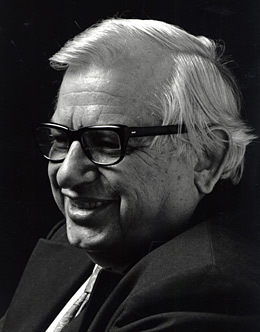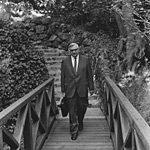Berkeleyan
| Albert Bowker was UC Berkeley's fifth chancellor, serving in the post from 1971-1980. (Eliot Khuner photo) |  |
Albert Bowker, fifth chancellor at Berkeley, dies at age 88
During the 1970's, he 'paved the way' for the campus of today
BERKELEY – Albert Hosmer Bowker, a former chancellor of the University of California, Berkeley, an expert in statistics and an innovative administrator during his decades-long career in higher education across the country, died Sunday in a retirement home in Portola Valley, Calif. He was 88 and had been suffering from pancreatic cancer.
A campus memorial service is set for 4:30 p.m. on Monday, Feb. 4, at the Faculty Club.
| Albert H. Bowker 1919-2008 |

The Bowker years: A slide show Oral history: A series of interviews with Albert Bowker, conducted in 1991 by Harriet Nathan of the Regional Oral History Office. |
As UC Berkeley's fifth chancellor, Bowker actively courted alumni support to compensate for losses in state financial support and, as a result, campus fundraising increased dramatically. Bowker established the UC Berkeley Foundation, which raised the money needed to construct Bechtel Engineering Center and Minor Hall Addition for the School of Optometry.
Ira Michael Heyman, a UC Berkeley professor emeritus who served as vice chancellor under Bowker and as chancellor from 1980 to 1990, said that during Bowker's term as chancellor dwindling state funding made it difficult to maintain existing programs and almost impossible to launch anything new. He applauded Bowker's role in setting up the UC Berkeley Foundation.
During the '70s, the UC Berkeley campus experienced overcrowded classrooms and labs, salary and hiring freezes, deferred building maintenance, and the elimination of large numbers of faculty, staff and administrative positions as a result of budget woes.
Bowker did help to create new programs in health sciences and energy studies, but disbanded and downgraded others. Under his leadership, the campus combined computer science with electrical engineering and blended forestry with agricultural science, while design went from a distinct department to a program within the College of Environmental Design. Both the criminology school and demography department were eliminated, although demography was later restored.
Also during Bowker's tenure as UC Berkeley chancellor, Women's Intercollegiate Athletics became a separate department with administrative standing parallel to that of the men's intercollegiate program.
Bowker is credited with helping to create small group advising for new students and with launching a program to encourage frustrated students who were qualified to enter UC Berkeley - but not admitted because of space limitations - to enroll in the less-crowded UC Santa Cruz.
He also signed landmark agreements with Beijing and Tsinghua universities in China to exchange scholars and library materials with UC Berkeley.
Bowker stood firm when 39 UC Berkeley students were cited in 1978 for trespassing at Sproul Hall during a sit-in. He said that while he appreciated their views and passions, "the main function of the university...is teaching and scholarship and not changing the world, no matter how desirable that may be." The students were censured following disciplinary hearings.
An editorial in the now-defunct Independent and Gazette, a newspaper in the neighboring city of Richmond, saluted Bowker upon his retirement from UC Berkeley, recalling "his soft voice and sharp brain."
Heyman said Bowker could be tough when he had to be, but displayed "uncanny political sensitivity" and had a knack for meeting and interacting with younger faculty.
"Al Bowker was an outstanding chancellor who paved the way for UC Berkeley into the modern era," said UC Berkeley Chancellor Robert J. Birgeneau. "For 28 years after stepping down as chancellor, Al Bowker remained an integral part of the Cal community, offering advice for the chancellors who came after him. I was always delighted to see him at the Faculty Club, entertaining colleagues and participating in campus life. He will be greatly missed."
Born in Winchendon, Mass., in 1919, Bowker grew up in Washington, D.C., where his father worked for the federal Bureau of Standards.
He earned his B.S. in mathematics at Massachusetts Institute of Technology (MIT) in 1941 and a Ph.D. in statistics at Columbia University in 1949. Bowker said he began as an industrial engineering major and studied mechanical engineering before settling on mathematics.
He began his professional career in 1941 as a research assistant in MIT's Department of Mathematics, and took a post as an associate mathematical statistician at Columbia University from 1943 to 1945.
Bowker became an assistant professor of math and statistics at Stanford University in 1947, and was chair of its statistics department from 1948 to 1959. He is credited with setting up a mathematical statistics research lab and a computer center at Stanford, where he served as the graduate division dean from 1959 to 1963.
Bowker was chancellor of the City University of New York (CUNY) from 1963 to 1971, where he supported a plan to provide free tuition for full-time CUNY undergraduates. During his tenure there, student enrollment nearly doubled, the institution grew from seven colleges to 20, and its budget increased by 300 percent.
Also while Bowker was at CUNY, the university adopted a previously unheard of open admissions policy. It guaranteed enrollment for all New York City high school graduates and essentially desegregated historically "very white" sections of the college, said Heyman.
Bowker's role in higher education continued after he left UC Berkeley in 1980. During the Carter administration, he accepted a position as assistant secretary for postsecondary education for the newly-formed U.S. Department of Education. He served there from 1980 to 1981, then took a post as dean of the School of Public Affairs at the University of Maryland from 1981 to 1984.
He was executive vice president of the University of Maryland from 1984 to 1986. He returned to CUNY as vice president for planning at its research foundation from 1986-1993.
Bowker loved to swim, fish and read. The latter was evidenced by the 4,000 pounds of books that he and his wife, Rosedith Sitgreaves, brought when they moved into the chancellor's residence on campus.
In 1996, he donned a toga to join former UC Berkeley Chancellor Chang-Lin Tien at a UC Berkeley archaeological site in Ancient Nemea, Greece, for a barefoot race with hundreds of people from around the world. The event recreated footraces once held there during the ancient Panhellenic Games.
Bowker adopted Nemea as one of his test-case, fundraising efforts, said Stephen Miller, the UC Berkeley emeritus professor of classics who led UC Berkeley's research at the Greek site for decades. Bowker's vision helped develop Nemea-related scholarly and popular publications, studies and dissertations by UC Berkeley students and faculty, and an archaeological park visited by 32,000 people in 2007 that features a museum, a temple of Zeus that is under reconstruction, and an ancient athletics stadium.
"Indeed, in 1996 that 'walking, talking unmade king-size bed,' as the undergraduates used to call him (Bowker), ran barefoot down the ancient stadium track at the first revival of the Nemean Games," said Miller. "It should surprise no one that the excavation house at Nemea bears, on its door, the little sign 'Bowker House.'"
In retirement, Bowker continued to indulge his love for the theater and the arts. Exposed to touring Broadway shows at the National Theatre in Washington, D.C., as a boy, Bowker was an avid theatergoer, and each spring semester at UC Berkeley for several years he taught a "Berkeley Little Theater" class. His students read plays and attended local theatrical performances, talking with cast members, directors, crews and theater managers afterward.
"I have always loved being part of the audience, and that is what I want to teach students," he said in a 2004 university newsletter.
Nicholas Jewell, a UC Berkeley professor of biostatistics and statistics who has worked in the campus administration, recalled Bowker as a terrific storyteller with a wonderful sense of humor, and as an impressive program builder with extensive political connections. When he joined the UC Berkeley administration following the tumultuous 1960s, Bowker "was the right man at the right time in the right place" to help stabilize the campus, said Jewell, also vice provost for academic personnel in the UC Office of the President.
Bowker received awards that included the Bronze Plaque from the Municipal Association for Management and Administration in 1967, and the Frederick Douglass Award from the New York Urban League in 1969. He was honored with the Berkeley Citation, one of the university's highest honors, in 1980.
He also received the Shewhart Medal of the American Society for Quality for "pioneering work in applying mathematical statistics ... enrichment of the science of quality through his teaching and his books ... and his blending of these sciences with human skills at the highest levels of university management."
Bowker was a fellow of the American Association for the Advancement of Science as well as of the American Statistical Association (ASA). He served as the ASA president in 1964, and was president of the Institute of Mathematical Statistics from 1961 to 1962.
He was a member of the Sloan Commission on Government and Higher Education, the National Drug Abuse Council, and MIT's board of trustees.
Bowker is survived by his son, Paul Albert Bowker of Cottonwood, Calif.; twin daughters, Caroline Anne Bowker Bliss and Nancy Kathleen Bowker, both of Palo Alto, and five grandchildren. He was married twice. His first wife was Elizabeth Rempfer, now deceased. In 1964, he married his second wife, Rosedith Sitgreaves, a professor of education and statistics at Stanford. She also is deceased.
Bowker maintained a home in Berkeley at University Terrace, a condominium community for university faculty and staff, having moved to a residence in Portola Valley several years ago to be close to his grandchildren.
In lieu of flowers, Bowker's family suggests contributions be made to the UC Berkeley Foundation (Attention: Vice Chancellor-University Relations, 2080 Addison St., #4200, Berkeley, CA, 94720-4200) or to the League to Save Lake Tahoe (955 Emerald Bay Rd., South Lake Tahoe, CA, 96150), with a notation that donations are being offered in Bowker's' memory.

